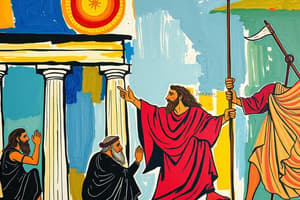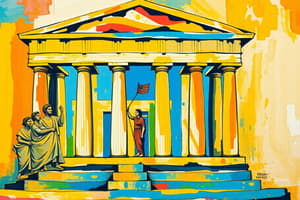Podcast
Questions and Answers
What does 'Classical' Culture refer to?
What does 'Classical' Culture refer to?
- An ancient and enduring culture like the Greeks or Romans (correct)
- A religious belief system
- A type of architectural style
- A modern cultural phenomenon
What is Cultural Diffusion?
What is Cultural Diffusion?
Spread of ideas, customs, or technology from one culture or people to another.
Which empire was ruled during 522 to 486 B.C. and was associated with Darius the road builder?
Which empire was ruled during 522 to 486 B.C. and was associated with Darius the road builder?
Persian Empire
What geographical feature made unity among Greeks difficult?
What geographical feature made unity among Greeks difficult?
What were the Greek City-States known as?
What were the Greek City-States known as?
Who were the inhabitants of the Island of Crete?
Who were the inhabitants of the Island of Crete?
Who reformed Athens into the world's first democracy?
Who reformed Athens into the world's first democracy?
What type of society was Sparta known as?
What type of society was Sparta known as?
What type of democracy did Athens have?
What type of democracy did Athens have?
What is Oligarchy?
What is Oligarchy?
What was the Delian League?
What was the Delian League?
What were the Peloponnesian Wars?
What were the Peloponnesian Wars?
Who was Socrates?
Who was Socrates?
What did Plato emphasize in his works?
What did Plato emphasize in his works?
Who was Aristotle?
Who was Aristotle?
What did Euclid's 'Elements' contribute to?
What did Euclid's 'Elements' contribute to?
What does the Pythagorean Theorem state?
What does the Pythagorean Theorem state?
What is the Parthenon?
What is the Parthenon?
Who calculated the circumference of the Earth?
Who calculated the circumference of the Earth?
What does Archimedes' principle state?
What does Archimedes' principle state?
Who built the Hellenistic Empire?
Who built the Hellenistic Empire?
What is Hellenism?
What is Hellenism?
What are the Seven Hills of Rome?
What are the Seven Hills of Rome?
What was the cry of Cato the Elder in the Senate?
What was the cry of Cato the Elder in the Senate?
What were the Twelve Tables?
What were the Twelve Tables?
What is the Rule of Law?
What is the Rule of Law?
What is the Roman Republic known for?
What is the Roman Republic known for?
Who were the Patricians?
Who were the Patricians?
Who were the Plebeians?
Who were the Plebeians?
Who dominated the Roman government?
Who dominated the Roman government?
Flashcards are hidden until you start studying
Study Notes
Classical Culture
- Represents ancient civilizations, notably Greece and Rome, with enduring cultural influences.
Cultural Diffusion
- The process of spreading ideas, customs, and technologies between different cultures.
Persian Empire
- Existed from 522 to 486 B.C. under Darius, known as the "road builder."
Geography of Greece
- Mountainous terrain limited unity among Greek populations, fostering independent city-states (polis) like Sparta and Athens.
- The sea served as a crucial link for trade and interaction with other regions.
Greek Polis
- Refers to city-states that emerged in Greece beginning around 750 BC.
Minoans of Crete
- An advanced civilization located on Crete, notable for the Palace at Knossos, featuring significant frescoes.
- Known as a thalassocracy, strong maritime society; civilization declined around 1400 BC, possibly due to volcanic activity.
Athens
- Initially an aristocracy governed by noble landowners, later became the first democracy initiated by Solon, though with limited voting rights.
Sparta
- A society centered on military training and warrior culture, ruled by a council of elders and kings, emphasizing discipline from childhood.
Democracy in Athens
- Recognized as a direct democracy where all male citizens aged 18 and older could vote, regardless of wealth.
Oligarchy
- A form of government where a small, affluent group holds power; Sparta had dual kingship alongside other elites.
Delian League
- A coalition of Greek city-states established for mutual defense and economic purposes.
Peloponnesian Wars
- A series of conflicts between Athens and Sparta lasting from 431 BC to 404 BC.
Socrates
- A philosopher critical of Athenian governance, known for promoting self-examination among his followers.
Plato
- A prominent philosopher whose works, including "The Allegory of the Cave" and "The Republic," highlighted the significance of rational thought.
Aristotle
- A philosopher and educator for Alexander the Great who advocated for reason and empirical observation as fundamental to knowledge.
Euclid
- Mathematician known for "Elements," which laid the groundwork for geometry.
Pythagoras
- Developed the Pythagorean Theorem (a² + b² = c²) and contributed significantly to philosophy, science, and mathematics.
Parthenon
- An ancient temple on the Athenian Acropolis dedicated to Athena, the patron goddess of Athens.
Eratosthenes
- Early mathematician and geographer credited with calculating the Earth's circumference.
Archimedes
- Formulated the principle stating that a body immersed in a fluid experiences upward buoyant force equal to the weight of displaced fluid.
Alexander the Great
- Ascended to the Macedonian throne following his father's assassination; known for creating the vast Hellenistic Empire through conquests.
Hellenism
- The cultural blending of Eastern and Western influences originating from the conquests of Alexander the Great, with Alexandria as its cultural epicenter.
Geography of Rome
- Situated on seven hills, with Palatine Hill being particularly significant to Rome's early development.
The Punic Wars
- Series of conflicts between Rome and Carthage, marked by Cato the Elder's call to destroy Carthage, notable for Hannibal's military campaign.
Twelve Tables
- The earliest codification of Roman law, establishing legal principles.
Rule of Law
- Refers to the legal framework within ancient Rome, encompassing over a millennium of legal development.
Roman Republic
- A political system featuring elected representatives and limited governmental power.
Patricians
- The upper class of Rome, consisting of landholding elites.
Plebeians
- The lower-class citizens of Rome, including farmers, merchants, and artisans, representing the majority of the population.
Senators
- Influential figures in Roman government, responsible for electing consuls who oversee military and civic affairs.
Studying That Suits You
Use AI to generate personalized quizzes and flashcards to suit your learning preferences.




